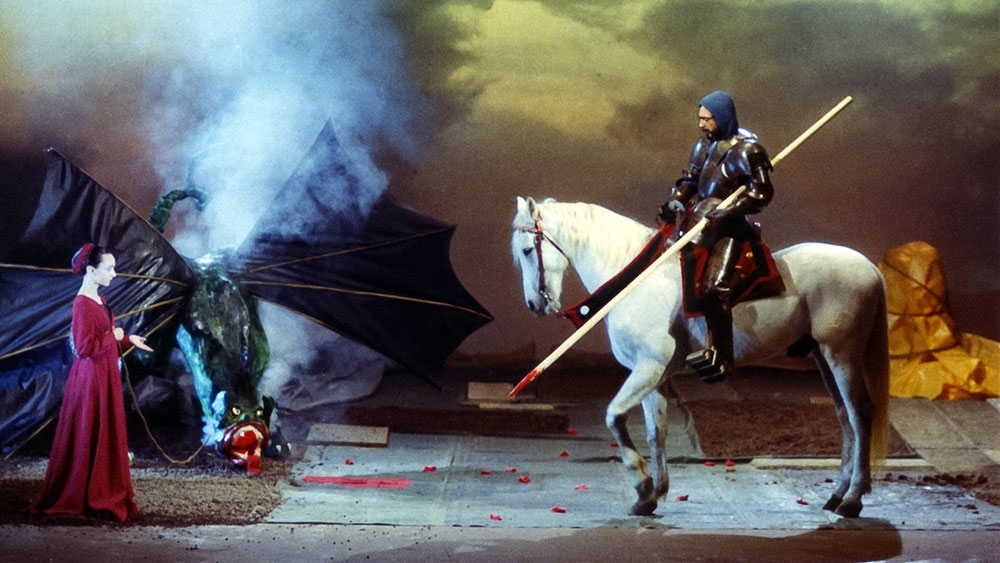Having completed a trilogy of Portuguese folktale adaptations for national television, João César Monteiro decided to break from the tradition of his working class New Portuguese Cinema pals by crowning himself king. He, as Rei de Portugal, appears briefly in the middle of Silvestre’s (1981) second courtly wedding banquet with a slender figure and simple attire unfit for a “Your Majesty.” He’s a mere observer to a story already at its end. The wedding is thanks to his grace; the feeding of a corpse to hogs, an extension.
Monteiro’s king is nameless and exercises no power other than the ability to end his film’s story. He is the king of a folktale repeated orally by peasants who had no knowledge of courtly inner-workings or penchants for pedantry. Along with his previous feature Trails (1978) and his television trilogy, Silvestre marked the end of a cycle that saw Monteiro explore and criticize his native Portugal through the oral tradition of its peoples.
However, unlike the docu-fiction of his compatriots (such as António Reis and Margarida Cordeiro’s Trás-os-Montes, 1976), unlike Monteiro’s previous works, and, indeed, unlike his future work, Silvestre opts for a Brechtian staging that highlights its artifice by showing the bisections of its stage and taking pride in its shallow back-projection. Normally this move is meant, like in the many films of Jean-Marie Straub and Danièle Huillet, to demystify the magic of the stage and the screen. But Monteiro curiously does so in a film that asks us to accept shapeshifters and glowing hands, and a spectacular entrance into the outer nebulae of our cosmos.
Silvestre’s two adapted sources, a Bluebeard tale and “A Donzela que Vai a Guerra,” have no identifiable authors, but in Monteiro’s hands they become equal parts François Rabelais and Thomas Malory. In the film, Sílvia (Maria de Medeiros in her first role) is expected to marry a bawdy older man until, one night, an even more licentious pilgrim (Luís Miguel Cintra), his beard masking his facial features, invites himself in, takes advantage of her sister Susana (Teresa Madruga), and fiends after Sílvia as if she were a jewel to be stolen in the night. She slices his hand off, sparking a series of events which force her to journey all over the kingdom as the shapeshifting pilgrim appears again and again with different legal claims to her hand in marriage. But, Sílvia herself is also prone to transformation, as she dons a boyish bob and joins the king’s roving knights as “Silvestre” to rescue her father from the mysterious rake.
The film ends on a note of heavenly justice, as Susana outs and kills the evil man. Sílvia marries a knight of noble intention and the director/king Monteiro casually orders the corpse in the middle of the banquet to be fed to the pigs. But, as Sílvia enters into the back-projected cosmos, her pursed face still seems unsatisfied as she announces, “Now I am alone before the stars.”
This moment marks the beginning of Monteiro’s penchant for combining art’s highest highs and lowest lows, which culminated in his final screen character, a dirty old man called “João de Deus.” Though the director was a fierce anti-Catholic, Silvestre makes plenty of reverential references to Catholic art, most notably a meticulous recreation of Paolo Uccello’s Saint George and the Dragon (1470). Cinematographer Acácio de Almeida cleverly places golds and greens to eliminate depth but highlight boundaries and the geometry of the stage, evoking a flat but brilliant look not unlike the tapestry stories that decorated castles of yore. And yet, all this brilliance dresses a story full of Rabelaisian perverts whose jokes about genitalia and coerced sex remind us of what this world of chivalry was really like. While Monteiro went on to set his later formally inventive tales of sexual miscreants in contemporary spaces, Silvestre shows him identifying with the tales of the common folk of the past. Theirs, too, was a world of duplicitous shapeshifters, of feigned nobility, of the cosmic wheel of fortune, and of the bawdy bard who slips a few dirty jokes in the middle of the story.
Silvestre screens this evening, November 18, at the Museum of Modern Art as part of “The Ongoing Revolution of Portuguese Cinema.”



